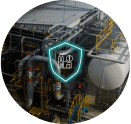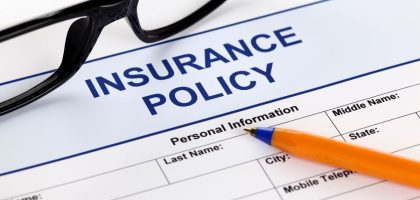Homepage » Engineering All Risk
Engineering All-Risk Insurance
If you are in the construction business, you might be aware that the construction business is highly linked to risks and accidents; thus, getting insurance is one of the most important things.
Consider this example – once there was Mr. Adam, who got a contract to lay out gas pipelines in Noida from Indira Gas Limited. The former company advised Mr. Adams to buy an engineering all-risk (EAR) policy equal to the project value so that they could safeguard themselves in the future. Mr. Adam didn’t listen, and while testing the pipeline, they found out that there was a crack in one of the pipes. Due to this, Mr. Adam faced a huge financial loss.
If Mr. Adam had brought the EAR policy, he could have gotten paid for all the losses.
Don’t be Mr. Adam, and read on to learn about EAR policy.
Types of Engineering All-Risk (EAR) Insurance
The types of Engineering All-risk insurance plans offered are as follows:

The machinery breakdown policy gives coverage for all types of plants and machinery units. This policy covers the cost of repairs and the replacement of damaged parts that have occurred due to unforeseen circumstances.

Sudden accidents, breakdowns, or failures of machinery vital to manufacturing units can restrict operations, resulting in losses. These vital units/machines are covered under the machinery loss profit insurance policy.

This policy provides comprehensive coverage for all the electronic equipment used in an industrial operation, be it physical loss/damage to all electronic equipment or data media or the increased cost of operations resulting from damage to the electronic equipment.

The projects comprise the storage of equipment, the moving of facilities, and dismantling or re-constructing them. The erection all-risk insurance offers protection against all such risks. This extensive coverage makes it the best solution for businesses with diverse needs.

A civil construction site is always susceptible to accidents and damages, and that’s why contractors are asked to ensure the completion of the project within the deadline. The aforementioned policy covers all the risks occurring on the site.

Factory operations always face the risk of lagging due to damaged machinery, which also leads to a loss of profit. The aforementioned insurance is a protection solution that is designed to cover losses occurring due to delays in operations.

The construction industry depends on machinery for its day-to-day operations. With a contractor’s plant and machinery insurance policy, you will get a protection solution for your machinery, thus minimizing the repair costs.
Why Do You Need Engineering All-risk Insurance?
Engineering all-risk insurance can save you from possible threats and bankruptcy that might occur due to the following scenarios:
- Engineering all-risk insurance gives protection against the credit risk of engineering a new building, loading/unloading at a construction site, storage, trials, maintenance, and some other costs of the necessary repairs.
- The policy gives peace of mind knowing that there is insurance to cover the costs if the project derails from its goal during the process.
- It will also protect you against any legal allegations that have been raised during the construction process.
- The engineering all-risk insurance even covers the cost of demolishing a faulty structure.
- For businesses, engineering all-risk insurance can offer protection against all kinds of financial losses related to project delays.
- Engineering all-risk insurance gives coverage for the cost of repairs if a property is damaged during the construction process.
- The insurance policy also covers the cost of alternative accommodation if families are forced to temporarily move out of their homes for construction.
Who Can Purchase Engineering All-Risk (EAR) Insurance?
An engineering all-risk insurance policy can be an ideal purchase for specific businesses. Businesses that involve developmental risks that can lead to devastating financial consequences.
For example- power plants, manufacturing and fabricating set-ups, wastewater treatment plants, and telecommunication centers.
The engineering all-risk insurance policy gives coverage at various stages of an engineering project. This can be storage, testing, handling, or commissioning at a plant or at a machinery engineering site. In addition to that, it also covers liability for injuries to third parties or damage to property during construction.
So, general contractors, subcontractors, engineers, architects, and people who are funding a construction project can buy EAR insurance.
What Will an Engineering All-Risk Policy Cover?
The EAR insurance cover begins at the time of the first consignment at the project site until the testing or handing over of the project to the principal employer or at the deadline, whichever is earlier.
The eventualities against which you are covered by an EAR policy are:
- Material Damage : Under this policy, you get coverage for damages occurring at the insured construction site, such as human errors, negligence, short-circuiting, impact damage, collapse of buildings, bridges, etc.
- Plant and Machinery : Any loss or damage to projects that are currently under construction, like electrical plants and machinery, equipment, and structures, with no civil engineerings work like short-circuiting, burglary, or theft.
- Construction Equipment : Any damage to a contractor’s construction equipment is also covered under the EAR insurance policy.
- Third-Party Liability : The occurrence of any third-party liability at the time of construction and the operational phase of the project also gets coverage under this policy.
What is Not Covered in the Policy?
The eventualities that are not covered under an engineering all-risk policy are:
- War, invasion, riot, strike, civil commotion, etc.
- Nuclear attacks and nuclear contamination
- Wilful negligence of the insured
- Cessation of work
- Defective material/bad workmanship
- Wear-tear, corrosion, oxidation, and deterioration
- Inventory losses
- Design defects
- Loss of files, cash, cheques, etc.
- Other consequential losses
How to File a Claim for Engineering All-Risks Insurance?
To file a claim under the EAR insurance policy, you must follow the below-mentioned steps:
- Contact the insurer and inform them about the incident/accident.
- Give details of the incident and the policy number
- Your claim will be registered and you will be given a claim registration number.
- A survey of the damage that occurred is conducted.
- Once the surveyor gives a thumbs up, the insurer confirms the financial and legal liabilities before settling the claim.
To Sum Up!
However, there are still a few things that you need to keep in mind while choosing engineering all-risk insurance. For example, to ensure you are getting the right coverage as per your needs, compare quotes from several different insurers to get the best price and ensure that you understand the terms and conditions of your policy before you sign the paper.
But what if, you could do all this and much more by right-clicking only once? Policy Wings is the platform for all your insurance-related problems. Visit the website today.
Frequently Asked Questions
The add-ons that can be availed of through payments are- storage risks at the fabricator's premises, clearance and removal of debris, terrorism risks, the additional cost of air freight, transit insurance, customs duty, escalation of sum insured, maintenance visits, and cross liability.
Yes
The policy period will be the same as the project period, that is, from the commencement of work or arrival of material at the project site up to testing and commissioning.
Yes, but premiums will be charged based on the actual commencement date. However, it is advisable to avail the policy on or before the commencement of the work.
Latest Blogs
Introduction At the time of renewing or buying car insurance, people generally have two main options in front of...
Introduction A lot of people treat insurance as a last-minute purchase and buy it only because it feels necessary in...
Whether it’s a little scratch or a big accident, a car insurance claim can save time, money and a...
Before buying term insurance, most people ask how much cover do they really need. You can’t buy a plan...
Introduction Insurance planning is not a challenge but can surely feel confusing with so many options, terms and mixed...
Introduction A lot of people treat insurance as a last-minute purchase and buy it only because it feels necessary...
Insurance is a financial protection that secures your family, health and assets against unexpected events. The market today is...
With every year, healthcare is becoming more expensive. Whether it’s a routine check-up or a surgery, medical bills are...










